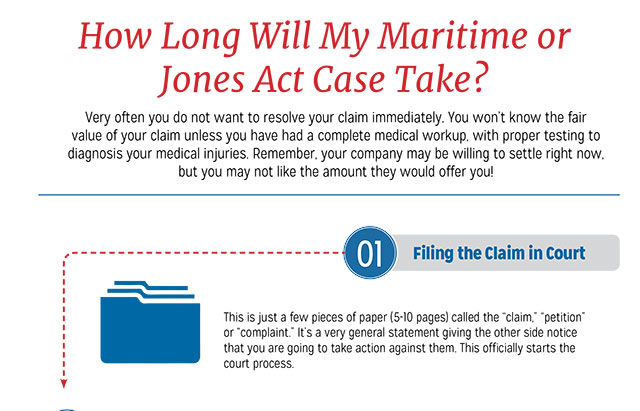Last Updated on February 28, 2025 by The Young Firm

This depends on where your claim is filed and the type of claim you have, but generally, claims take about 9 months to maybe a year or longer. It is important to remember that your claim may be resolved in as little as 4 to 6 months once the basic discovery is done in your case. Also, very often you do not want to resolve your claim immediately. We routinely arrange for medical treatment and testing for our clients which can show further injuries. You won’t know the fair value of your claim unless you have had a complete medical workup, with proper testing to diagnosis your medical injuries. Remember, your company may be willing to settle right now, but you may not like the amount they would offer you!
Maritime law cases can take anywhere from a couple months to over a year to be resolved. Maritime injury cases are not quick, simple cases. In a typical “soft tissue” car accident case, a paralegal or legal staff member will negotiate a fast settlement of a few thousand dollars for you with an insurance company adjuster. Your maritime injury case is much more serious and complicated. Your case will be handled by attorneys. Typically if you have suffered a serious injury, especially injuries which have required surgery, you may be seeking hundreds of thousands of dollars, if not more.
What Factors Determine How Long My Case May Take?
There are several reasons that affect how long a maritime case can last. Any one of these reasons could influence your case.
- Maritime Law and Jones Act law allows for injured workers to collect large amounts of money. Unlike car accidents where you might get $10,000, in Jones Act or Maritime Cases you could receive hundreds of thousands of dollars, even millions*. Maritime companies and their insurance companies simply do not pay settlements of this amount without fully investigating and attempting to defend your claim. Because of this your company (the defendants) will go to extensive lengths to fight the case, which means…
- Your company will delay the process as much as possible.Unfortunately, a case cannot proceed without a certain amount of cooperation from the other side. They must respond to emails, return letters, send important documents, provide date and times to meet and conduct a depo, etc. At each step of the process, they have an opportunity to delay. They might wait a few days to respond or simply ignore your lawyer’s requests for documents until they’re forced by the court to hand them over. This means that it can be very slow going.
- Maritime cases have a lot of moving parts. There are dozens of individuals involved in a maritime case. Not only do they have your attorney, you, and the defendant (your company/third party), maritime cases will also likely require a doctor (or two), a vocations expert, court reporters, other witnesses, and sometimes even judges and juries. All of these individuals will have their own schedules that must be accommodated and any delay from them can delay the entire process.
- The client can cause delays. Sometimes, but by no means always, we will have clients that delay their cases because they don’t respond to our emails, letters, and request for information in a timely fashion. Anytime we’re waiting on feedback from a client, it prevents the case from moving forward. While there are some things we can proceed with without the client’s feedback, we do require some level of participation in order to have a successful (and quick) case completion.
- The client may need surgeries/medical care. In order to prove that you deserve the amount of money you’re asking for, you must have a doctor confirm the extent of your injuries through testing and even surgeries. Each doctor’s visit can take a few weeks to schedule. Then our office must receive the results back from the doctor’s office, which can take another few days up to a few weeks.
- The types of damages you’re seeking can prolong the case. For instance, mental anguish in a lawsuit can be difficult to fight because it is not a physical injury, therefore, other kinds of experts are needed. Likewise, if you went for treatment at a clinic that was chosen by your company and were wrongfully treated, your maritime company may be held responsible (negligence). The investigation of these types of claims can be difficult and time-consuming.
- Which court your case is filed in also plays a part. Generally speaking, Federal courts go a little faster than State courts. There are different procedures and rules for each court and so the length of your case will be influenced by which court your case is in.
- Maritime and Jones Act law require certain rules and procedures. If you have suffered an injury in a maritime accident, federal admiralty-maritime law has certain regulations that your employer must follow. Similarly, our lawyers must follow a specific process when moving your case. Certain paperwork must be filed by certain deadlines before the case can move forward. While the process can take an extended amount of time, the consequence of not going through the steps after a serious injury or accident will leave you with nothing.

Though maritime cases can take several months to complete, the most important thing to remember is what will happen in the interim period. You’ll be getting the medical treatment and help you need. Your maritime or Jones Act case may be one of the most important experiences of your life so you need to handle it correctly, which may take time. If your husband has been injured, he’s probably receiving some sort of medical treatment.
You Can’t Control How Long Maritime Cases Take, But You Can Control Who You Hire
While the duration of the claims process is largely out of your control, you do have the power to select an attorney from one of the law firms in New Orleans who you trust. Your selection can make a world of difference.
The attorney you hire should unrelentingly pursue the investigation of your case and aggressively defend your claim against your employer and/or their insurance carrier. The Young Firm located in New Orleans has attorneys that have been trained to fight for your legal rights after a maritime accident, and they understand the process of fighting maritime law cases.
More articles on the maritime injury case process:

